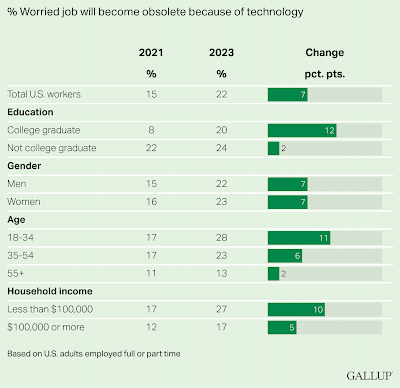My long-term readers are likely aware that George Orwell's 1984 is one of my favourite books, one that I have read many times. Let me provide you with a few quotes from the book that I found compelling and that are particularly pertinent given the recent events in Canada:
"With the deep, unconscious sigh which not even the nearness of the telescreen could prevent him from uttering when his day’s work started, Winston pulled the speakwrite towards him, blew the dust from its mouthpiece, and put on his spectacles. Then he unrolled and clipped together four small cylinders of paper which had already flopped out of the pneumatic tube on the right-hand side of his desk.
In the walls of the cubicle there were three orifices. To the right of the speakwrite, a small pneumatic tube for written messages, to the left, a larger one for newspapers; and in the side wall, within easy reach of Winston’s arm, a large oblong slit protected by a wire grating. This last was for the disposal of waste paper. Similar slits existed in thousands or tens of thousands throughout the building, not only in every room but at short intervals in every corridor. For some reason they were nicknamed memory holes. When one knew that any document was due for destruction, or even when one saw a scrap of waste paper lying about, it was an automatic action to lift the flap of the nearest memory hole and drop it in, whereupon it would be whirled away on a current of warm air to the enormous furnaces which were hidden somewhere in the recesses of the building....
....As soon as Winston had dealt with each of the messages, he clipped his speakwritten corrections to the appropriate copy of ‘The Times’ and pushed them into the pneumatic tube. Then, with a movement which was as nearly as possible unconscious, he crumpled up the original message and any notes that he himself had made, and dropped them into the memory hole to be devoured by the flames.
What happened in the unseen labyrinth to which the pneumatic tubes led, he did not know in detail, but he did know in general terms. As soon as all the corrections which happened to be necessary in any particular number of ‘The Times’ had been assembled and collated, that number would be reprinted, the original copy destroyed, and the corrected copy placed on the files in its stead. This process of continuous alteration was applied not only to newspapers, but to books, periodicals, pamphlets, posters, leaflets, films, sound-tracks, cartoons, photographs—to every kind of literature or documentation which might conceivably hold any political or ideological significance. Day by day and almost minute by minute the past was brought up to date. In this way every prediction made by the Party could be shown by documentary evidence to have been correct, nor was any item of news, or any expression of opinion, which conflicted with the needs of the moment, ever allowed to remain on record. All history was a palimpsest, scraped clean and reinscribed exactly as often as was necessary. In no case would it have been possible, once the deed was done, to prove that any falsification had taken place. The largest section of the Records Department, far larger than the one on which Winston worked, consisted simply of persons whose duty it was to track down and collect all copies of books, newspapers, and other documents which had been superseded and were due for destruction."
"And when memory failed and written records were falsified—when that happened, the claim of the Party to have improved the conditions of human life had got to be accepted, because there did not exist, and never again could exist, any standard against which it could be tested."
"It might very well be that literally every word in the history books, even the things that one accepted with- out question, was pure fantasy."
And, most importantly:
"The Party told you to reject the evidence of your eyes and ears. It was their final, most essential command."
Winston Smith's sole purpose in the dystopic society described in 1984 was to destroy history and replace it with the version that matched the current government-proclaimed reality, a never-ending process.
Let's look at some background before we get to the main point of this posting. For those of you who are not Canadians (or residents of the United Kingdom), you may not be aware that every word uttered in Canada's Parliament is recorded for posterity in Hansard, the official record of the transcripts of parliamentary debate. In fact, the record is so complete that it even reports nonsensical verbal sounds that are uttered in the chamber, a tradition that began in Britain in the late 18th century. It was implemented to reduce the secrecy that had been part of British political debate, allowing the sweaty masses an insider's view of parliamentary procedures.
In recent days, the world has become very familiar with Canada and the Trudeau government's bungling when a former member of the Waffen-SS, the combat arm of the Shutzstaffel, the much-feared and reviled SS of Hitler's National Socialist Party was formally and publicly recognized for his service in Canada's House of Commons by the now former Speaker of the House as shown here:
After some sober second thought and attention by Members of the Opposition, this caused a great deal of consternation among the ruling Liberals who tossed Speaker Anthony Rota under the proverbial bus by pinning the sole blame on him for this egregious misstep. What isn't as well known is that the ruling Liberals attempted to "memory hole" the entire incident both in writing and in the official video record of the incident, using the Leader of the Government in the House of Commons, Karina Gould to do the dirty work as shown here:
Here is the quote as it appears in Hansard for September 25, 2023:
If the less than honourable Karina Gould had been able to get unanimous consent from all MPs, the record of one of her government's most significant missteps would have been erased from the public record.
Here is the response from Conservative MP Marty Morantz which provides the rationale for voting against Ms. Gould's point of order and sums up my feelings nicely:
"It goes without saying that those who do not learn from history are doomed to repeat it. What happened on Friday was shameful and brought embarrassment to this chamber. It was an ugly reminder of what survivors of the Holocaust know too well: that we must never forget. Deleting the text of the Speaker's words from Hansard would...have only one purpose: to try to forget what happened and wash the record clean."
And, for the record, here's what appeared in Hansard for September 21, 2023 despite Ms. Gould's pathetic attempt to rewrite history:
We all know that governments love to alter history, however, I have rarely seen a clearer example of how a government attempts to rewrite history by memory holing the record of an event that will likely have a negative impact on their re-electability in the future should Canadians remember this international embarrassment. The Trudeau government's brazen attempt to change history should concern every voting Canadian.
The ruling class must really think that we are stupid.

































